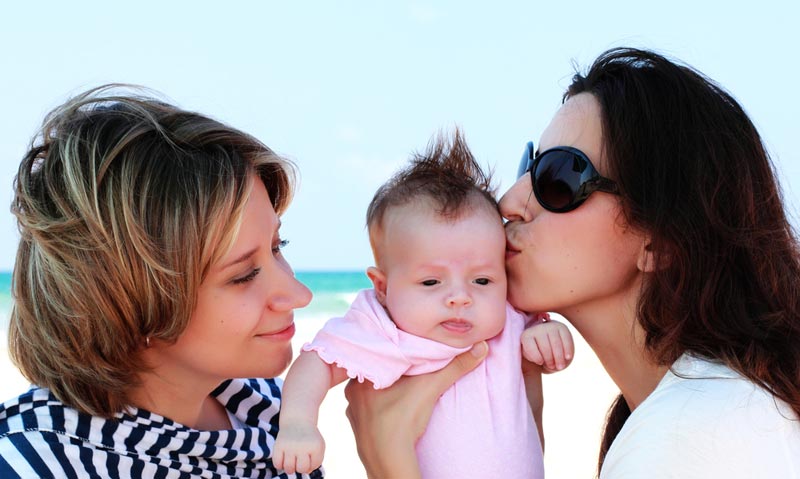5 Scientific Reasons Gay Parents Are Awesome

The American Academy of Pediatrics announced today (March 21) its support for same-sex marriage, as well as full foster care and adoption rights for same-sex couples.
"Children thrive in families that are stable and that provide permanent security, and the way we do that is through marriage," Benjamin Siegel, who co-authored the policy statement, said in a statement. "The AAP believes there should be equal opportunity for every couple to access the economic stability and federal supports provided to married couples to raise children."
Research on the children of gay couples is an emerging field, but so far, the evidence is on the AAP's side. Here are five reasons that gay parents typically do a great job raising kids.
1. They choose to have kids
Straight couples all to frequently have "oops" babies. According to the Guttmacher Institute, about half of U.S. pregnancies are unplanned, and about half of those unplanned pregnancies end in birth rather than abortion. Parents of unplanned babies can do a great job, of course, but some are in dire circumstances. Two-thirds of unplanned births in 2006 were paid for by Medicaid or other low-income insurance programs, according to Guttmacher.
Gay couples, in contrast, generally have to plan to have babies, overcoming biological limits to adopt, find surrogates or sperm donors, or use in vitro fertilization methods. After persevering through those challenges, gay parents "tend to be more motivated, more committed than heterosexual parents on average, because they chose to be parents," Abbie Goldberg, a psychologist at Clark University in Massachusetts who researches gay and lesbian parenting, told LiveScience last year.
Thus, the group parenting score of gay parents isn't as dragged down by people who fell into parenthood accidentally and weren't prepared, Goldberg said. [10 Scientific Tips for Raising Happy Kids]
Sign up for the Live Science daily newsletter now
Get the world’s most fascinating discoveries delivered straight to your inbox.
2. They nurture the neediest
Gay parents are a huge resource for kids awaiting adoption, particularly the neediest cases. In October 2011, the Evan B. Donaldson Adoption Institute found that 60 percent of gay and lesbian adoptive parents adopt across races, which is important because minority kids have a tougher time getting out of the foster system. And 25 percent of kids placed with adoptive gay and lesbian parents were older than 3 — also a tough age range to adopt. More than half of the kids had special needs.
A 2007 report by the Urban Institute found that more than half of gay men and 41 percent of lesbians in the United States would like to adopt. That's a huge number of potential parents, far dwarfing the more than 100,000 adoptable kids stuck in foster care today.
3. They foster tolerance
Here's an advantage straight from the horse's mouth: Kids raised by gay and lesbian parents say their upbringing taught them open-mindedness and empathy.
In a 2007 study published in the American Journal of Orthopsychiatry, Clark University's Goldberg interviewed 46 adults who grew up with at least one gay parent. Twenty-eight of the interviewees independently mentioned that they felt their upbringing made them more tolerant and accepting.
"Men and women felt like they were free to pursue a wide range of interests," Goldberg said. "Nobody was telling them, 'Oh, you can't do that, that's a boy thing,' or 'That's a girl thing.'" [5 Myths About Gay People Debunked]
4. Their kids do fine in school
Kids of gay parents appear to do well academically, too. A review of all of the existing research on same-sex parents and their children, published in 2010, found that their grade point averages (GPA) were on par with kids of two-parent heterosexual homes. In a study comparing teens living in both types of households, boys of lesbian parents had an average GPA of 2.9, compared with 2.65 for boys of heterosexual parents. Teen girls raised by two moms had an average GPA of 2.8, compared with 2.9 for girls raised by a mother and father. (Because more lesbians than gay men have children, studies on the former are more common.)
Another study in the analysis found the same rate of delinquent activities, such as shoplifting or fighting, in kids of lesbian parents and kids of straight parents.
In May 2012, a study in the Journal of Marriage and Family found that kids in same-sex families scored the same in math ability as kids in heterosexual families, after controlling for family stability factors such as previous divorces.
5. They raise confident children
An upbringing in a same-sex household can give kids a boost of confidence. In a 2010 study published in the journal Pediatrics, researchers examined the kids of planned lesbian families, in which a single lesbian mother or two lesbian partners decided to have kids, in contrast to bringing them to the relationship from previous heterosexual partnerships. Like other studies of lesbian moms, this one found no significant differences from straight parents in kids' development and social behavior.
But the kids of lesbians were more confident than the kids of straight parents. According to the researchers, active involvement by parents may explain the self-esteem boost.
Follow Stephanie Pappas on Twitter and Google+. Follow us @livescience, Facebook & Google+. Original article on Live Science.

Stephanie Pappas is a contributing writer for Live Science, covering topics ranging from geoscience to archaeology to the human brain and behavior. She was previously a senior writer for Live Science but is now a freelancer based in Denver, Colorado, and regularly contributes to Scientific American and The Monitor, the monthly magazine of the American Psychological Association. Stephanie received a bachelor's degree in psychology from the University of South Carolina and a graduate certificate in science communication from the University of California, Santa Cruz.









